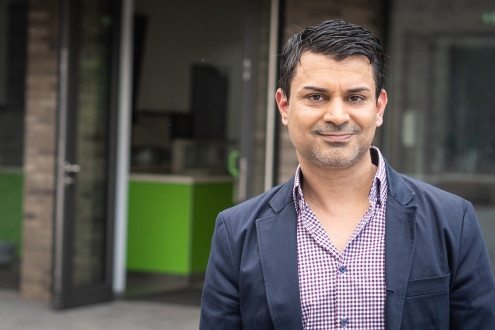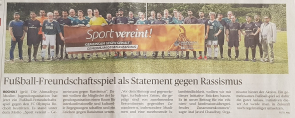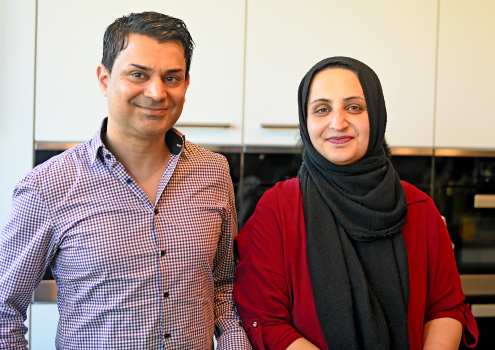Ataf Chaudhry
We all belong to the human family!
Ataf Chaudhry is a member of the Integration Council and one of the three deputy chairmen. In an interview with Bruno Wansing, the integration officer of the city of Bocholt, he is introduced for the series "We in IR".
Ataf Chaudhry, 45 years old, has been married to Kanwal Chaudhry (39) since 2004 and has four children with her, a daughter, Jazba Javed (15), and three sons, Kashif Javed (16), Waleed Ahmed (9) and Ali Ahmed (8).
Escape at the age of seven
Chaudhry had to leave his home country of Pakistan at the age of seven because he and his family were persecuted for religious reasons as followers of the Ahmadiyya Muslim Jamaat community. In 1987, he, his mother and his sister followed their father, who had worked as a pharmacist in Pakistan and had fled a year earlier. The family initially lived in Frankfurt before being relocated to Bocholt. There the family moved into a flat on Mussumer Ringstraße in a house on the railway line. He and his sister were then joined by two more siblings in Bocholt.
As the eldest, he had a hard time at first. "I couldn't speak the language, my parents couldn't help me and so I had to muddle through on my own". Particularly in the early days, there was no contact with classmates due to the housing situation. However, things improved when I moved into a flat on Theodor-Heuss-Ring. "I had more contact, was able to meet up with classmates and - above all - I was able to play football at FC Olympia Bocholt. My coach was Ludger Teklote, who always supported me. At the Ss. Ewaldi parish centre, where I also received homework help and made use of it. He eventually learnt German, particularly through the remedial lessons at Diepenbrockschule.
After completing his secondary school leaving certificate at the Arnold-Jansen-Schule, he began training as an industrial mechanic at Caisley. He completed his training in 2002, was then allowed to work as a journeyman at Caisley for a while, but then had to look for a new job. He found this at VKF Renzel, where he still works as an industrial mechanic today. "We manufacture everything we need for production ourselves in our own machine shop", reports Chaudhry.
Existing machines are further developed and improved. "That's the nice thing, developing, building and carrying out maintenance and repair work on various machines myself, I have a very varied job because I always have to familiarise myself with new tasks", says Chaudhry.
Becoming an integration councillor through volunteering
Contact in sport or voluntary work often leads to venturing into areas that were not previously on the radar. This was also the case for Ataf Chaudhry. Through his work in the Ahmadiyya Muslim Jamaat community in Bocholt, where he was already active as a teenager, he reconnected with his former team-mate Juan Lopez Casanava. "I had organised a friendly match with a team from FC Olympia Bocholt with our youth section and afterwards Juan, who was also active with the FCO, came to me and asked me if I would like to have a look at the Integration Council since I was so active as a volunteer". He did so and got to know Elisabeth Löckener and Rosina Giorgio there. Both were elected to the Integration Council via the "Zusammen aktiv" list. He then put his name on the list for the 2020 election and then took her place when Elisabeth Löckener, who was also Deputy Chairwoman of the Integration Council, moved to the north and had to give up her seat. " Elisabeth in particular influenced and shaped me with her commitment." He himself started volunteering in the community at an early age.
Memet Cinar will be missed
Memet Cinar is another person who has shaped and influenced him greatly. "Memet has always influenced me with his direct and calm way of holding a conversation and making his views clear", emphasises Chaudhry. Memet Cinar recognised early on what was important for people with an international family history. Chaudhry cites his commitment to a Muslim section of the Bocholt cemetery as an example. "If someone is prepared to bury their relatives in Bocholt, it means that Bocholt is also seen as their home." As is well known, Cinar is no longer standing for the Integration Council. "We will miss him because he brought a lot of good ideas to the Integration Council. As we have pursued the same (integration) policy, I would be delighted if he came to visit us from time to time and stayed in dialogue with us."
Personal enrichment
"While working on the Integration Council and at the same time taking on the position of Deputy Chairman, I got to know many people, whether they were politicians, employees of the administration, EWIBO, FABI or the Caritas Association. The integration officer Bruno Wansing was and still is a great help, as he was always able to answer my many questions on the subject of integration. I knew him from his time at the mayor's office, when he accompanied the charity walk." As a member of the Integration Council, many doors opened for him. "I was able to further expand my voluntary work, found opportunities to talk to a wide variety of people and succeeded in breaking down existing misunderstandings. For me personally, my work on the Integration Council has been personally enriching."
Education, counselling, encounters and participation
In the "Zusammen aktiv" list, which is also standing for the integration council elections on 14 September 2025, Ataf Chaudhry and his fellow campaigners advocate four pillars that are important for the integration of people with an international family history: education, counselling, encounters and participation. "Education - and that includes language - is very important in life. It starts with speaking the language of the country you live in", emphasises Chaudhry. Counselling people and also looking after them has something to do with "service". "It is important that you pass on your own experiences so that they do not make the same mistakes as you do." Together with the Integration Council and the Integration Officer, he wants to continue to ensure that encounters are possible and can be created. "Through such encounters, we build bridges in society between people of different origins, different religions and different views,we all belong to the humanfamily and we have to show that", Chaudhry said emphatically. The topic of "participation" has occupied the board of the Integration Council for years. "If we involve people properly, then we show the person sitting opposite that they belong and that their voice is heard." This is also a sign of appreciation. With the amendment of Section 27 of the municipal code, the issue of "consultation sequence" is now also clearly regulated, so that the Integration Council, which will in future be called the Committee for Equal Opportunities and Integration, will be included in the political decision-making process.
The Integration Council's motto "Talk more with each other instead of about each other" has already been well internalised. "I would be delighted if the members of the Integration Council were to make their own contributions at the meetings."
As far as the public perception of the Integration Council is concerned, this has progressed immensely following the installation of Bruno Wansing as Integration Officer. "The Integration Council is becoming better and better known", says Ataf Chaudhry, above all through our many events in which the cultural associations and Bocholt residents are directly involved, the quarterly newsletter, press reports and the Facebook page.
Finding solutions
Ataf Chaudhry has a clear answer to the question of how the Integration Council co-operates with politicians and the administration. "Since we have really put our motto "Always stay in dialogue" and "talk to each other and not about each other" into practice, the relationship with politicians has become very good overall. We address issues together and try to find solutions that also meet the needs of people with an international family history. The example of "Takenkamp" in particular quickly made politicians realise that we have to approach each other." Cooperation with the administration works very well. Bruno Wansing, as Managing Director of the Integration Council, keeps the threads of communication well together and "I particularly like the fact that we can always address all important topics directly with the mayor in the jour fix with him", says Ataf Chaudhry.
And what needs to be improved in the Integration Council itself? "We work very well together on the board with the chairman and the three deputies. In the Integration Council itself, it is important to take a uniform line, then we can get things implemented", Chaudhry knows. "I would like the elected representatives to come to the meetings and get involved on a regular basis. Anyone who has only attended five meetings out of a maximum of 25 meetings in five years has hardly been able to do anything for integration work, which is a shame."
Knowing and helping neighbours
"For me, successful integration starts with the neighbours", emphasises Chaudhry, "if I don't know the people in my neighbourhood and don't help them, I can't expect others to do the same. It is always important for me to approach others and talk to them." You can't talk without the language. "It is important to speak the language that everyone else speaks in the country in which we live." In addition to helpfulness and language, events where people can meet are also important. For example, intergenerational cooking, the IHelp project, 1 May, the IKW, etc. We are well organised in Bocholt.
And what comes after 14 September?
I would like to build on the good work we have done together and hope that we can maintain the jour fix with the mayor as well as the regular discussions with politicians. As many clubs do not have permanent access to premises, the Lernwerk should be made even more accessible to cultural organisations that do not have their own premises, including for internal club celebrations.






